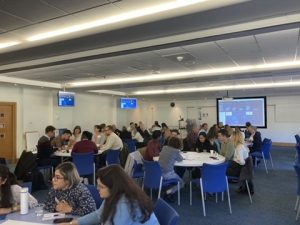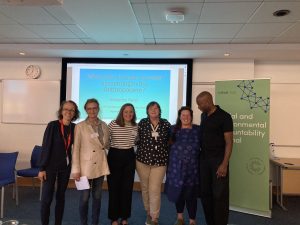Michelle Rodrigue & Shona Russell
The ECoP’s first hybrid event was held on Wednesday 28th August 2024 as part of the 34th International Congress on Social and Environmental Accounting Research held in the University of St Andrews. The challenging event theme ‘What does it mean to teach accounting in the Anthropocene?’ hoped to start a discussion among the broader CSEAR community about the implications of the Anthropocene for sustainability accounting education. The event opened with short provocations from speakers ranging from approaches and competences for education for sustainable development (Rehema White, University of St Andrews) to ways of integrating sustainability topics into accounting education through a questioning of conventional practices (Sheila Killian, University of Limerick), and to deeper concerns about how cultures of education can prohibit learning and limit students’ development (Ann-Christine Frandsen and Nicholas Bailey, University of Birmingham). While each provocation offered great insights on its own, the complementarity and richness of the perspectives brought by our speakers from within and outside the accounting discipline is undeniable.

ECoP 9 discussions (Photo credit: Shona Russell)
Then, conference delegates discussed the provocations and additional prompts to
Speakers joined some of the groups for further engagements and discussions. In the spirit of the community of practice, the groups were invited to share their reflections via an online whiteboard, with the event resulting in the co-curation of various innovative approaches to accounting education.
This was the first time an ECoP event has been included in the international congress. Its inclusion, as well as the enthusiastic response it received, reflects a growing and sustained interest in education related to SEA, sustainability, and specific topics such as human rights or the circular economy (incidentally, topics that have been discussed in other ECoP events, see ECoP 2 and ECoP 1). Insights from the plenary session included expectations of students and employers; the requirements of accreditation across higher education and accounting degrees; and fear of failure or uncertainty

ECoP Speakers and Organisers (Left to right: Michelle Rodrige, Ann-Christine Frandsen, Shona Russell, Sheila Killian, Rehema White and Nicholas Bailey)
We thank all speakers and conference delegates for participating in the discussions. Thanks to conference organisers for creating space for a discussion about education during the annual congress. Our speakers mentioned a range of resources (listed below) and generously shared their material , which is available in the CSEAR Members’ area.
Resources mentioned by speakers
Kopnina, H. 2020. Education for the future? Critical evaluation of education for sustainable development goals, The Journal of Environmental Education, 51:4, 280-291
Orr, D.W. 2004. Earth in mind: on education, environment, and the human prospect. Island Press
Quality Assurance Agency for Higher Education and Advance HE 2021: ‘Education for Sustainable Development Guidance’. (Accessible via this link https://www.advance-he.ac.uk/knowledge-hub/education-sustainable-development-guidance)
Sterling, S. 2011. Transformative Learning and Sustainability: sketching the conceptual ground. Learning and Teaching in Higher Education. Issue 5, 17-33
Vásquez-Fernández, A.M. and Cash Ahenakew pii tai poo taa, 2020. Resurgence of relationality: reflections on decolonizing and indigenizing ‘sustainable development’. Current Opinion in Environmental Sustainability, 43, pp.65-70.
White, R. (no date) Education for Sustainable Development: A brief guide. (accessible in CSEAR’s members’ area)
White, R.M., K. Möbius, B. King, K. Leask, S. Peres, J. Walker, and P. Higgens. 2023. A Handbook for Monitoring and Evaluating Education for Sustainable Development in Universities. (https://www.qaa.ac.uk/docs/qaa/members/handbook-for-monitoring-and-evaluating-esd-in-universities.pdf
